Ditapis dengan
E-book Encyclopedia of Communication Theory
Sociolinguistic research in the 1950s and 1960s had shown how people change the degree of formality of their language as a function of the social contexts in which they find themselves. This was explained in terms of social norms dictating language use. In other words, we should speak very softly and respectfully here, but we can be more boisterous and casual there. Communication (or speech) ac…
- Edisi
- -
- ISBN/ISSN
- 9781412959377
- Deskripsi Fisik
- 1174 hlm
- Judul Seri
- -
- No. Panggil
- 380.03 LIT e
E-book The Universe in a Nutshell
By the century's end, discrepancies in the idea of an all-pervading ether began to appear. It was expected that light would travel at a fixed speed through the ether but that if you were traveling through the ether in the same direction as the light, its speed would appear lower, and if you were traveling in the opposite direction of the light, its speed would appear higher. Yet a series of exp…
- Edisi
- -
- ISBN/ISSN
- 0593048156
- Deskripsi Fisik
- 219 hlm
- Judul Seri
- -
- No. Panggil
- 530.12 HAW t
E-book Samurai Warfare
The Ancestors of the Samurai The word 'samurai', which is commonly used for all varieties of ancient Japanese warrior, actually signifies the military elite of old Japan, a knightly caste who commanded armies, and also led their followers into battle. Their military and political skills eventually enabled them to control civilian governments, developing, through almost constant civil warfare, a…
- Edisi
- -
- ISBN/ISSN
- 1854092804
- Deskripsi Fisik
- 157 hlm
- Judul Seri
- -
- No. Panggil
- 739.7 TUR s
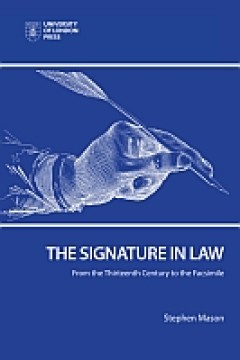
E-Book The Signature in Law: From the Thirteenth Century to the Facsimile
This book explores the judicial development of the concept of the signature from the thirteenth century to the age of the facsimile transmission. It puts the concept of the signature into a broad legal context to set out the purposes that can be attributed to a signature, and to explain the functions a signature is capable of performing. Drawing on cases from common law jurisdictions across the…
- Edisi
- -
- ISBN/ISSN
- 9781911507321
- Deskripsi Fisik
- 122 halaman
- Judul Seri
- -
- No. Panggil
- 342 MAS t
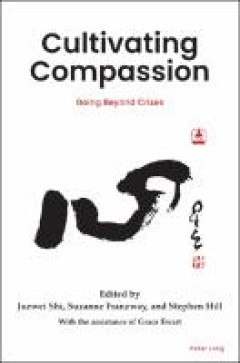
E-Book Cultivating Compassion: Going Beyond Crises
The massive disruptions caused by climate change, the Covid-19 Pandemic, war, and ever-rising inequalities have presented the world with challenges across social and economic life, health and education, policy, politics, and community life. Compassion is a central Buddhist value and practice but is also essential to our survival. Defined as feeling genuine concern about the suffering of others …
- Edisi
- -
- ISBN/ISSN
- 9781803741949
- Deskripsi Fisik
- 9783631868102
- Judul Seri
- -
- No. Panggil
- 181.043 SHI c
E-book Posthumanism and the Graphic Novel in Latin America
The emergence of the contemporary graphic novel across many regions of the world has been closely implicated with posthumanist thought. Science fiction narratives forged from multiple real and imagined cou-plings between technology, bodies and subjectivities feature prom-inently in the various competing genealogies for the medium. The French bande dessinée tradition,…
- Edisi
- -
- ISBN/ISSN
- 9781911576501
- Deskripsi Fisik
- 266 hlm
- Judul Seri
- -
- No. Panggil
- 741.5 KIN p
E-book Patent Landscape Reoprt on Animal Genetic Resources
This patent landscape report provides an overview of international patent activity for animal genetic resources, in particular those relating to food and agriculture. The empirical analysis of patent activity for animal genetic resources for food and agriculture has received remarkably little attention in the scientific literature. Indeed, in conducting the present research we found no example …
- Edisi
- -
- ISBN/ISSN
- -
- Deskripsi Fisik
- 178 hlm
- Judul Seri
- -
- No. Panggil
- 591.3 OLD p
E-book Phonology in the Twentieth Century
This book is primarily concerned with the history of linguistics, but it is notsimplyaboutthe history of linguistics. For one thing, positions are taken belowon issues which (while they arise in a historical context) are discussed for theirown sake, such as the motivation for assuming a significant level of phoneticrepresentation in linguistics. Further, while the text traces the development of…
- Edisi
- -
- ISBN/ISSN
- 9783961103270
- Deskripsi Fisik
- 545 hlm
- Judul Seri
- -
- No. Panggil
- 414 AND p
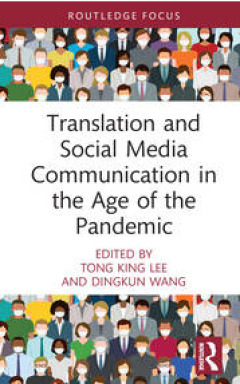
E-book Translation and Social Media Communication in the Age of the Pandemic
This collection of essays represents the first of its kind in exploring the conjunction of translation and social media communication, with a focus on how these practices intersect and transform each other against the backdrop of the cascading COVID-19 crisis. The contributions in the book offer empirical case studies as well as personal reflections on the topic, illuminating a broad range of t…
- Edisi
- -
- ISBN/ISSN
- 9781003183907
- Deskripsi Fisik
- 128 hlm
- Judul Seri
- -
- No. Panggil
- 302.23 LEE t
E-book Rethinking Health Care Ethics
The audience for this book is anyone who has experienced a discrepancy between their own individual thinking about ethics—whether in med-icine, nursing, social work, psychology, or other fields—and what they encounter in the academically oriented, comparatively theoretical dis-cussions of ethics as presented in grand rounds, at conferences, and in profes…
- Edisi
- -
- ISBN/ISSN
- 9789811308307
- Deskripsi Fisik
- 177 hlm
- Judul Seri
- -
- No. Panggil
- 171.7 SCH r

E-book Hippocrates Now
“We need to talk about Hippocrates. Current scholarship attributes none of the works of the ‘Hippocratic corpus’ to him, and the ancient biographical traditions of his life are not only late, but also written for their own promotional purposes. Yet Hippocrates features powerfully in our assumptions about ancient medicine, and our beliefs about what medicine – and the physician himself �…
- Edisi
- -
- ISBN/ISSN
- 9781350005907
- Deskripsi Fisik
- 262 hlm
- Judul Seri
- -
- No. Panggil
- 610.938 KIN h
E-book The Life of Breath in Literature, Culture and Medicine Classical to C…
This open access book studies breath and breathing in literature and culture and provides crucial insights into the history of medicine, health and the emotions, the foundations of beliefs concerning body, spirit and world, the connections between breath and creativity and the phenomenology of breath and breathlessness. Contributions span the classical, medieval, early modern, Romantic, Victori…
- Edisi
- -
- ISBN/ISSN
- 2634-6443
- Deskripsi Fisik
- 558 hlm
- Judul Seri
- -
- No. Panggil
- 902 ADE t
E-book Reimagining the Role of Technology in Education
Technology can be a powerful tool for transforming learning. It can help affirm and advance relationships between educators and students, reinvent our approaches to learning and collaboration, shrink long-standing equity and accessibility gaps, and adapt learning experiences to meet the needs of all learners. Our schools, community colleges, adult learning centers and universities should be inc…
- Edisi
- -
- ISBN/ISSN
- -
- Deskripsi Fisik
- 111 hlm
- Judul Seri
- -
- No. Panggil
- 370 SOU r
E-book Anthology of Classical Myth
Since the stories told by poets and other early writers represented the major evidence for the events for which the Greeks had no written records, historians could not escape considering the role of myth in history. One approach—represented here by Herodotus’ and Thucydides’ analyses of the Trojan, Persian, and Peloponnesian Wars—was to seek to distinguish where myth left off and histor…
- Edisi
- 2nd ed
- ISBN/ISSN
- 978-1-62466-499-1
- Deskripsi Fisik
- 608 hlm
- Judul Seri
- -
- No. Panggil
- 820 TEA a
E-book Encyclopedia of Volcanoes
The Encyclopedia of Volcanoes is a complete reference guide, providing a comprehensive view of volcanism on the Earth and on the other planets of the Solar System that have exhibited volcanic activity. It is the first attempt to gather in one place such a vast store of knowledge on volcanic phenomena. The volume addresses all aspects of volcanism, ranging from the generation of magma, its trans…
- Edisi
- -
- ISBN/ISSN
- -
- Deskripsi Fisik
- 1442 hlm
- Judul Seri
- -
- No. Panggil
- 551.21 SIG e
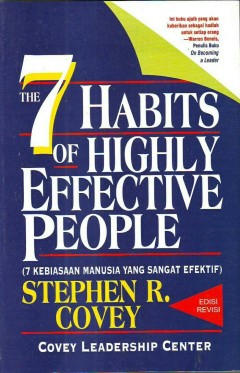
The 7 Habits of Highly Effective People (7 Kebiasaan Manusia yang Sangat Efek…
- Edisi
- Edisi Revisi
- ISBN/ISSN
- 9789795836032
- Deskripsi Fisik
- 384 hlm; 16 x 24,5 cm
- Judul Seri
- -
- No. Panggil
- 158.1 STE t
- Edisi
- Edisi Revisi
- ISBN/ISSN
- 9789795836032
- Deskripsi Fisik
- 384 hlm; 16 x 24,5 cm
- Judul Seri
- -
- No. Panggil
- 158.1 STE t
E-book Eden in the East
Pada akhir Zaman Es, banjir yang disebutkan dalam kitab suci memang benar-benar terjadi dan menenggelamkan paparan benua Asia Tenggara untuk selamanya. Hal itulah yang menyebabkan penyebaran populasi dan tumbuh suburnya berbagai budaya Neolitikum di Cina, India, Mesopotamia, Mesir, dan Mediterania timur. Akar permasalahan dari pemekaran besar peradaban di wilayah subur di Timur Dekat Kuno, bera…
- Edisi
- -
- ISBN/ISSN
- -
- Deskripsi Fisik
- 860 hal
- Judul Seri
- -
- No. Panggil
- 959 OPP e

Electric Machinery
- Edisi
- 5th ed
- ISBN/ISSN
- 0071129464
- Deskripsi Fisik
- xi; 585 hal; 16 x 23 cm
- Judul Seri
- -
- No. Panggil
- 621.31 FIT e
- Edisi
- 5th ed
- ISBN/ISSN
- 0071129464
- Deskripsi Fisik
- xi; 585 hal; 16 x 23 cm
- Judul Seri
- -
- No. Panggil
- 621.31 FIT e

Ninja, A.D. 1460-1650
The ninja were the secret agents and assassins of feudal Japan and they remain a subject of enduring fascination. They first arose during the power struggles of 9th and 10th century Japan - where they catered for an increasing demand for spies, informants and assassins - and were used until the mid-1600s when, due to a campaign to destroy them, disappeared.
- Edisi
- -
- ISBN/ISSN
- 978-1-84176-525-9
- Deskripsi Fisik
- ilus 64 hlm. 18x25 cm
- Judul Seri
- -
- No. Panggil
- 355 TUR n

E-book The Red Badge of Courage
Following the experiences of 19-year-old Henry Fleming, a recruit in the American Civil War, the story is about the meaning of courage. One of the most influential American anti-war stories ever written.
- Edisi
- -
- ISBN/ISSN
- -
- Deskripsi Fisik
- 134 p. 706 KB
- Judul Seri
- -
- No. Panggil
- 823 STE t
E-book The wild olive
Finding himself in the level wood-road, whose open aisle drew a long, straight streak across the sky, still luminous with the late-lingering Adirondack twilight, the tall young fugitive, hatless, coatless, and barefooted, paused a minute for reflection. As he paused, he listened; but all distinctiveness of sound was lost in the play of the wind, up hill and down dale, through chasm and ove…
- Edisi
- -
- ISBN/ISSN
- -
- Deskripsi Fisik
- 417 hlm; 0.6 mb
- Judul Seri
- -
- No. Panggil
- 823 KIN t

E-book The Diary of a U-boat Commander
The M.S. of this amazing diary of a German U-Boat Commander has fallen into our hands under somewhat unusual and mysterious circumstances, the name of the writer being withheld for reasons which will be readily apparent to all who read his astounding experiences. It is, however, a story so thrilling and sensational that we have no hesitation in offering it as it stands to the public, kept so lo…
- Edisi
- -
- ISBN/ISSN
- -
- Deskripsi Fisik
- 142 p. 765 KB
- Judul Seri
- -
- No. Panggil
- 823 STE d

Ekonomi uang dan bank
- Edisi
- -
- ISBN/ISSN
- -
- Deskripsi Fisik
- xii, 595 halaman : 18 x 25 cm
- Judul Seri
- -
- No. Panggil
- 332 GOL e
- Edisi
- -
- ISBN/ISSN
- -
- Deskripsi Fisik
- xii, 595 halaman : 18 x 25 cm
- Judul Seri
- -
- No. Panggil
- 332 GOL e

Everyday greatness : inspiration for a meaningful life
- Edisi
- -
- ISBN/ISSN
- -
- Deskripsi Fisik
- -
- Judul Seri
- -
- No. Panggil
- 155.2 COV e
- Edisi
- -
- ISBN/ISSN
- -
- Deskripsi Fisik
- -
- Judul Seri
- -
- No. Panggil
- 155.2 COV e

Seni berbicara kepada siapa saja,kapan saja, di mana saja.
- Edisi
- cet. 21
- ISBN/ISSN
- 978-979-22-2853
- Deskripsi Fisik
- XVI; 211 hlm;;13 X 20 CM
- Judul Seri
- -
- No. Panggil
- 00.1.54 KIN s
- Edisi
- cet. 21
- ISBN/ISSN
- 978-979-22-2853
- Deskripsi Fisik
- XVI; 211 hlm;;13 X 20 CM
- Judul Seri
- -
- No. Panggil
- 00.1.54 KIN s

SENI BERBICARA KEPADA SIAPA SAJA, KAPAN SAJA, DI MANA SAJA
- Edisi
- cet. 21
- ISBN/ISSN
- 978-979-22-2853
- Deskripsi Fisik
- XIII; 212 hlm;;13 x 20 cm
- Judul Seri
- -
- No. Panggil
- 001.54 KIN s
- Edisi
- cet. 21
- ISBN/ISSN
- 978-979-22-2853
- Deskripsi Fisik
- XIII; 212 hlm;;13 x 20 cm
- Judul Seri
- -
- No. Panggil
- 001.54 KIN s

First thing First :Dahulukan yang utama.
- Edisi
- ed. 2
- ISBN/ISSN
- 979-605-289-x
- Deskripsi Fisik
- xxii; 450 hlm;15 x 23 cm
- Judul Seri
- -
- No. Panggil
- 158 COV d
- Edisi
- ed. 2
- ISBN/ISSN
- 979-605-289-x
- Deskripsi Fisik
- xxii; 450 hlm;15 x 23 cm
- Judul Seri
- -
- No. Panggil
- 158 COV d

Why good things happen to good people : 10 Pedoman praktis hidup lebih sehat,…
- Edisi
- cet. 1
- ISBN/ISSN
- 978-979-8994-47
- Deskripsi Fisik
- 412 hlm;;15,5 x 23,5 cm
- Judul Seri
- -
- No. Panggil
- 128 POS w
- Edisi
- cet. 1
- ISBN/ISSN
- 978-979-8994-47
- Deskripsi Fisik
- 412 hlm;;15,5 x 23,5 cm
- Judul Seri
- -
- No. Panggil
- 128 POS w

The 7 habits of highly effective people : Powerful lessons in personal change
In The Habits of Highly Effective People, author Stephen R. Covey present a holistic, integrated, principle-centered approach for solving personal and professional problems. With penetrating insight and pointed anecdotes, Covey reveals a step-by-step pathway for living with fairness, integrity, service, and human dignity principles that give us the security to adapt to change and the wisdom and…
- Edisi
- 22
- ISBN/ISSN
- 6780203269513
- Deskripsi Fisik
- 372 pages; illus. 14 x 21,5 cm
- Judul Seri
- -
- No. Panggil
- 158 COV t
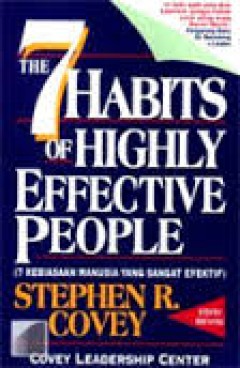
Tujuh (7) kebiasaan manusia yan sangat efektif = The 7 Habits of highly effec…
Dalam Tujuh Kebiasaan Manusia yang sangat Efektif, menyajikan sebuah pendekatan yang menyeluruh, terpadu, dan berpusat pada prinsip untuk memecahkan masalah pribadi dan profesional. Dengan wawasan yang tajam dan anekdot yang terarah, Covey menyingkapkan sebuh jalan langkah demi langkah untuk hidup dengan keadilan, integritas, kejujuran, dan martabat manusia prinsip-prinsip yang memberi kita ja…
- Edisi
- cet. 2
- ISBN/ISSN
- 9786027228955
- Deskripsi Fisik
- 472 hlm.; illus. 14 x 21 cm
- Judul Seri
- -
- No. Panggil
- 158 COV t

Tujuh (7) kebiasaan manusia yang sangat efektif ed.revisi
- Edisi
- cet. 1
- ISBN/ISSN
- 978-979-583-603
- Deskripsi Fisik
- 384 hlm; illus;16 x 24,5 cm
- Judul Seri
- -
- No. Panggil
- 158 COV t
- Edisi
- cet. 1
- ISBN/ISSN
- 978-979-583-603
- Deskripsi Fisik
- 384 hlm; illus;16 x 24,5 cm
- Judul Seri
- -
- No. Panggil
- 158 COV t

Everyday greatness: Inspirasi untuk mencapai kehidupan yang bermakna
- Edisi
- -
- ISBN/ISSN
- 978-979-22-2864
- Deskripsi Fisik
- xx; 542 hlm;;15 x 23 cm
- Judul Seri
- -
- No. Panggil
- 155.2 COV e
- Edisi
- -
- ISBN/ISSN
- 978-979-22-2864
- Deskripsi Fisik
- xx; 542 hlm;;15 x 23 cm
- Judul Seri
- -
- No. Panggil
- 155.2 COV e

Sejarah singkat waktu = A brief history of time
Stephen Hawking menjelaskan sejarah terbentuknya ruang dan waktu serta keterkaitannya dengan alam semesta melalui ilmu fisika. Untuk menjelaskan ruang dan waktu ini, Stephen Hawking mulai dari awal pemikir-pemikir hebat dari masa lampau yang sedang melakukan pemikiran luar biasa mengenai bentuk dan gambaran alam semesta ini. Mulai dari Aristoteles (340 SM) dengan teori bahwa bumi itu berb…
- Edisi
- cet. 4
- ISBN/ISSN
- 9789792292121
- Deskripsi Fisik
- xi + 290 hlm.; illus. 13,5 x 20 cm
- Judul Seri
- -
- No. Panggil
- 502 HAW s

Sejarah singkat saya = My brief history
“STEPHEN HAWKING telah memukau para pembaca sedunia dengan serangkaian buku laris yang menjelajahi misteri alam semesta. Sekarang, untuk pertama kalinya, sang ahli kosmologi paling brilian pada zaman kita ini menoleh ke dalam dirinya untuk meninjau kehidupannya dan evolusi intelektualnya sendiri. My Brief History menceritakan perjalanan luar biasa Stephen Hawking, dari masa kecilnya di Londo…
- Edisi
- cet. 2
- ISBN/ISSN
- 9786020300061
- Deskripsi Fisik
- 174 hlm.; illus.
- Judul Seri
- -
- No. Panggil
- 925 HAW s

Setelah matahari terbenam = Just after sunset
Koleksi cerpen yang brilian dari Stephen King, Siapa selain Stephen King yang bisa mengubah toilet portabel menjadi kanal kelahiran belendir, atau bar pinggir jalan menjadi tempat untuk cinta abadi? Seorang penjual buku yang marah mengangkut seorang pembonceng bisu, tanpa menyadari bahwa pria itu mendengar semua ocehannya dengan sangat jelas. Atau rutinitas olahraga dengan sepeda stasioner, yan…
- Edisi
- cet. 1
- ISBN/ISSN
- 9786020300610
- Deskripsi Fisik
- 576 hlm. 13,5 x 20 cm
- Judul Seri
- -
- No. Panggil
- 823 KIN s

TUJUH (7) KEBIASAAN MANUSIA YANG SANGAT EFEKTIF - ED. REVISI
- Edisi
- cet. 1
- ISBN/ISSN
- 978-979-583-603
- Deskripsi Fisik
- 384 hlm; illus;16 x 24,5 cm
- Judul Seri
- -
- No. Panggil
- 158 COV t
- Edisi
- cet. 1
- ISBN/ISSN
- 978-979-583-603
- Deskripsi Fisik
- 384 hlm; illus;16 x 24,5 cm
- Judul Seri
- -
- No. Panggil
- 158 COV t

BEING THE BOSS: HOW TO MAKE A SUCCESS OF YOUR SMALL BUSINESS
- Edisi
- -
- ISBN/ISSN
- 0-85969-557-3
- Deskripsi Fisik
- 112 hlm;22 x 13,5 cm
- Judul Seri
- -
- No. Panggil
- 658 FIT b
- Edisi
- -
- ISBN/ISSN
- 0-85969-557-3
- Deskripsi Fisik
- 112 hlm;22 x 13,5 cm
- Judul Seri
- -
- No. Panggil
- 658 FIT b

PEMBANGUNAN EKONOMI DI DUNIA KETIGA - 1
- Edisi
- ed.8
- ISBN/ISSN
- 979-688-995-1
- Deskripsi Fisik
- xxiii; 583 hlm; illus;17,5 x 25 cm
- Judul Seri
- -
- No. Panggil
- 338.9 TOD p
- Edisi
- ed.8
- ISBN/ISSN
- 979-688-995-1
- Deskripsi Fisik
- xxiii; 583 hlm; illus;17,5 x 25 cm
- Judul Seri
- -
- No. Panggil
- 338.9 TOD p

PEMBANGUNAN EKONOMI DI DUNIA KETIGA - 1
- Edisi
- ed.8
- ISBN/ISSN
- 979-688-995-1
- Deskripsi Fisik
- xxiii; 583 hlm; illus;17,5 x 25 cm
- Judul Seri
- -
- No. Panggil
- 338.9 TOD p
- Edisi
- ed.8
- ISBN/ISSN
- 979-688-995-1
- Deskripsi Fisik
- xxiii; 583 hlm; illus;17,5 x 25 cm
- Judul Seri
- -
- No. Panggil
- 338.9 TOD p

PEMBANGUNAN EKONOMI DI DUNIA KETIGA - 1
- Edisi
- ed.8
- ISBN/ISSN
- 979-688-995-1
- Deskripsi Fisik
- xxiii; 583 hlm; illus;17,5 x 25 cm
- Judul Seri
- -
- No. Panggil
- 338.9 TOD p
- Edisi
- ed.8
- ISBN/ISSN
- 979-688-995-1
- Deskripsi Fisik
- xxiii; 583 hlm; illus;17,5 x 25 cm
- Judul Seri
- -
- No. Panggil
- 338.9 TOD p

THE STORY OF THE INTERNET: Level - 5
- Edisi
- cet. 3
- ISBN/ISSN
- 0-582-43047-X
- Deskripsi Fisik
- vii; 72 pages;13 x 20cm
- Judul Seri
- -
- No. Panggil
- 823 BRY t
- Edisi
- cet. 3
- ISBN/ISSN
- 0-582-43047-X
- Deskripsi Fisik
- vii; 72 pages;13 x 20cm
- Judul Seri
- -
- No. Panggil
- 823 BRY t

TUJUH ( 7 ) KEBIASAAN MANUSIA YANG SANGAT EFEKTIF: Pelajaran Yang Berharga Un…
- Edisi
- cet. 1
- ISBN/ISSN
- -
- Deskripsi Fisik
- xii; 341 hlm;16 x 24 cm
- Judul Seri
- -
- No. Panggil
- 158 COV t
- Edisi
- cet. 1
- ISBN/ISSN
- -
- Deskripsi Fisik
- xii; 341 hlm;16 x 24 cm
- Judul Seri
- -
- No. Panggil
- 158 COV t

PRINSIP KERJA TELEVISI
- Edisi
- cet. 1
- ISBN/ISSN
- -
- Deskripsi Fisik
- vii; 119 hlm; illus;20 x 13,5 cm
- Judul Seri
- -
- No. Panggil
- 621.388 KIN p
- Edisi
- cet. 1
- ISBN/ISSN
- -
- Deskripsi Fisik
- vii; 119 hlm; illus;20 x 13,5 cm
- Judul Seri
- -
- No. Panggil
- 621.388 KIN p

GADIS PENGGEMAR TOM GORDON
- Edisi
- cet. 1
- ISBN/ISSN
- 979-655-677-4
- Deskripsi Fisik
- 320 hlm;11 x 18 cm
- Judul Seri
- -
- No. Panggil
- 823 KIN g
- Edisi
- cet. 1
- ISBN/ISSN
- 979-655-677-4
- Deskripsi Fisik
- 320 hlm;11 x 18 cm
- Judul Seri
- -
- No. Panggil
- 823 KIN g

CATUR: Dari Langkah Pertama Hingga Sekakmat
- Edisi
- cet. 1
- ISBN/ISSN
- 978-979-28-0523
- Deskripsi Fisik
- 64 hlm; illus;23 x 23 cm
- Judul Seri
- -
- No. Panggil
- 794.1 KIN c
- Edisi
- cet. 1
- ISBN/ISSN
- 978-979-28-0523
- Deskripsi Fisik
- 64 hlm; illus;23 x 23 cm
- Judul Seri
- -
- No. Panggil
- 794.1 KIN c
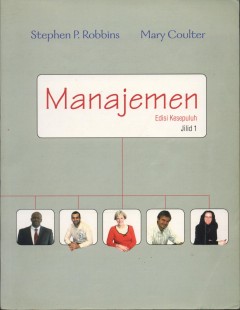

 Karya Umum
Karya Umum  Filsafat
Filsafat  Agama
Agama  Ilmu-ilmu Sosial
Ilmu-ilmu Sosial  Bahasa
Bahasa  Ilmu-ilmu Murni
Ilmu-ilmu Murni  Ilmu-ilmu Terapan
Ilmu-ilmu Terapan  Kesenian, Hiburan, dan Olahraga
Kesenian, Hiburan, dan Olahraga  Kesusastraan
Kesusastraan  Geografi dan Sejarah
Geografi dan Sejarah